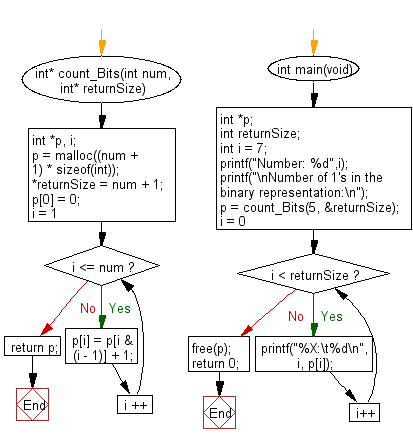C Exercises: Calculate the number of 1's in their binary representation and return them as an array
C Programming Mathematics: Exercise-14 with Solution
For a non negative integer in the range 0 ≤ i ≤ n write a C programming to calculate the number of 1's in their binary representation and return them as an array.
Example:
Input:
Number: 7
Number of 1's in the binary representation:
0: 0
1: 1
2: 1
3: 2
4: 1
5: 2
Sample Solution:
C Code:
#include <stdio.h>
#include <stdlib.h>
int* count_Bits(int num, int* returnSize) {
int *p, i;
p = malloc((num + 1) * sizeof(int));
*returnSize = num + 1;
p[0] = 0;
for (i = 1; i <= num; i ++) {
p[i] = p[i & (i - 1)] + 1;
}
return p;
}
int main(void)
{
int *p;
int returnSize;
int i = 7;
printf("Number: %d",i);
printf("\nNumber of 1's in the binary representation:\n");
p = count_Bits(5, &returnSize);
for (i = 0; i < returnSize; i++) {
printf("%X:\t%d\n", i, p[i]);
}
free(p);
return 0;
}
Sample Output:
Number: 7 Number of 1's in the binary representation: 0: 0 1: 1 2: 1 3: 2 4: 1 5: 2
Flowchart:

C Programming Code Editor:
Improve this sample solution and post your code through Disqus.
Previous: Write a C programming to check if a given integer is a power of three.
Next: Write a C programming to get the maximum product from a given integer after breaking the integer into the sum of at least two positive integers.
What is the difficulty level of this exercise?
Test your Programming skills with w3resource's quiz.
C Programming: Tips of the Day
Static variable inside of a function in C
The scope of variable is where the variable name can be seen. Here, x is visible only inside function foo().
The lifetime of a variable is the period over which it exists. If x were defined without the keyword static, the lifetime would be from the entry into foo() to the return from foo(); so it would be re-initialized to 5 on every call.
The keyword static acts to extend the lifetime of a variable to the lifetime of the programme; e.g. initialization occurs once and once only and then the variable retains its value - whatever it has come to be - over all future calls to foo().
Ref : https://bit.ly/3fOq7XP
- New Content published on w3resource:
- HTML-CSS Practical: Exercises, Practice, Solution
- Java Regular Expression: Exercises, Practice, Solution
- Scala Programming Exercises, Practice, Solution
- Python Itertools exercises
- Python Numpy exercises
- Python GeoPy Package exercises
- Python Pandas exercises
- Python nltk exercises
- Python BeautifulSoup exercises
- Form Template
- Composer - PHP Package Manager
- PHPUnit - PHP Testing
- Laravel - PHP Framework
- Angular - JavaScript Framework
- Vue - JavaScript Framework
- Jest - JavaScript Testing Framework
